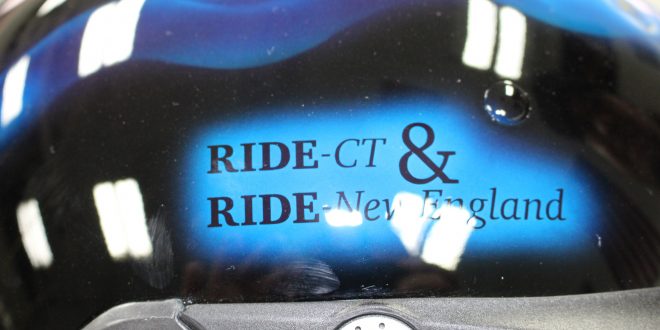With the Connecticut General Assembly once again considering a universal helmet law, members of the writing staff here at RIDE-CT & RIDE-NewEngland were asked if they had any strong feelings on it, and whether or not they favor the proposed legislation. By a 5-0 margin, the scribes, who have decades upon decades of riding experience and are experts in the field of motorcycling, voted that Connecticut should have a mandatory helmet law. Here’s how they responded:
Steve Smith, CONREP instructor:
When I first began riding at age 13, it was all dirt and trail riding in the woods near our home in suburban New York. My parents were adamant about using a helmet and eye protection as well as gloves and other gear. I probably learned the value myself rather quickly. My  first time through the trails branches hit across my face shield and hands. I took more than my fair share of tumbles and spills as a novice and experienced trail rider. The consequences of how easy it was to have an impact with the ground or other immovable objects like rocks and trees were a motivating factor of helmet use.
first time through the trails branches hit across my face shield and hands. I took more than my fair share of tumbles and spills as a novice and experienced trail rider. The consequences of how easy it was to have an impact with the ground or other immovable objects like rocks and trees were a motivating factor of helmet use.
As I moved to street riding, helmet use was a given as New York has a mandatory use helmet law, but it was no big deal as I had already realized the safety value from five-plus years of trial riding. Years later, I moved to Connecticut and did not change my habits. I feel naked without wearing protective gear.
Without getting in to the politics of freedom of choice, I feel use of proper protective gear is of paramount importance to riders in the event of a crash. If you’re one who doesn’t care to believe the many studies conducted since the 1980s, speak to friends who are police, EMT or emergency room nurses. Head and brain injuries are the leading cause of fatalities in motorcycle crashes.
When it comes to crashes, it may not be the rider’s fault, but the rider never ends up on the winning side against another vehicle. If required helmet use can save the life of one rider there is value. I feel it will save many more than that.
I want to share one story of an incident from a training class about a decade ago. On the first riding day of the course a student with a brand new motorcycle branded half-helmet made it very clear to those present that since his friends did not wear helmets, he did not plan to do so. This helmet was for the class only. When asked what he thought about the classroom discussion regarding head impact and head and brain injury, his response was that he would just hold his head up in the event of a crash.
We were running the maximum braking exercise and this student was coming to a stop with the other group and instructor across the parking lot. He was approaching the stopping point at approximately 15 miles per hour when he began to apply the brakes; apparently a bit too much as the front tire locked up and he took a spill. The bike was righted and the exercise continued. After the exercise other students were around him having a discussion and looking at the significant gouges on the side of the helmet where it impacted with the ground. I asked him, “What happened to holding up your head?” He replied, “I may have to rethink my position on helmet use!”
Paul Siciliano, CONREP instructor:
I support implementing the mandatory use of a helmet for both motorcycles and scooters in the state. In my days racing motocross, there was never an option to opt out of using a helmet in competition nor do I remember anyone ever wanting to. I have attended riding courses, superbike schooling as well as piloted drag bikes on both 1/8 and 1/4 mile track, and a helmet (and other gear) is a requirement for all.
courses, superbike schooling as well as piloted drag bikes on both 1/8 and 1/4 mile track, and a helmet (and other gear) is a requirement for all.
Mind you, this is in an environment of other riders all of whom are skilled and respectful of their fellow riders. Out on our public roads that is not the case. I have to take evasive action on my motorcyles in order to protect myself each and every ride from a distracted and/or inconsiderate motorist. With all my years of experience riding public roads I have still come up short on two occasions and have been struck. Both times my helmet bore significant damage. Statistics show helmets save lives. They certainly have saved mine. The research and statistics support that to be fact.
Bob Rosen, dealer consultant and former general manager of multi-brand dealership:
It seems that, with the possible exception of politics, there are few issues as contentious as helmet laws. Having a discussion about whether or not states have the right to mandate helmet use can be a quick route to loud voices, strong language, and bruised feelings. Objective evidence supporting the use of helmets to reduce the potentially devastating effects of a motorcycle crash is generally not at the center of the controversy. Oh, there are a few out there who believe that wearing a helmet is actually less safe than going lidless – restricted vision and hearing, limited mobility, etc. However, most folks agree that helmet use reduces the chance and severity of an injury in a fall.
Objective evidence supporting the use of helmets to reduce the potentially devastating effects of a motorcycle crash is generally not at the center of the controversy. Oh, there are a few out there who believe that wearing a helmet is actually less safe than going lidless – restricted vision and hearing, limited mobility, etc. However, most folks agree that helmet use reduces the chance and severity of an injury in a fall.
Then why the dissention? It’s all about choice. We Americans have had the ability to choose just about everything in our lives. Unfortunately, not all those choices have had positive outcomes. Considering the cost to society of our tendency towards unhealthy behavior, it’s surprising that there aren’t even more laws and regulations governing our daily lives. Perhaps the main reason that helmet use gets more attention than other potentially deadly behaviors is that it targets a small sub-set of the population. Attempting to legislate the use of helmets has far less potential for negative political fallout than, say, putting restrictions on the consumption of fast food or controlling the production of cigarettes – both of which affect vastly more people than the use of helmets.
Not all choices, however, carry the same weight of unintended consequences. What clothing I choose to wear or what sort of education I choose to pursue are largely personal decisions. Even though these choices could also have some unintended consequences, their effect on society is not as great as many other lifestyle choices. Including whether or not I choose to wear a helmet. Motorcycle crash statistics are quite definitive in identifying the higher injury factors associated with non-helmet wearing. Given the post-crash cost to society, we can make a strong case for wearing helmets. Whether or not that use should be legislated brings us back to the beginning of this circular discussion.
Having been a helmet wearer for over 40 years, my thoughts on whether or not to wear a helmet are pretty well established. I think riders who choose to not wear a helmet leave themselves open to more severe outcomes from a motorcycle crash. The broader implications of those outcomes leads me in the direction of supporting helmet laws.
Victoria Zandonella, founder of Northeast Dualsport Riders:
As a longtime on and off-road motorcyclist and emergency medical first responder in Connecticut, I favor reinstating a helmet law for the safety of riders traveling within our state. Over the past eight years, I have led several riding groups and motorcycle tours within the  Northeast and have sadly witnessed the outcomes of multiple motorcycle accidents. I have had friends and family members suffer cranial
Northeast and have sadly witnessed the outcomes of multiple motorcycle accidents. I have had friends and family members suffer cranial
injuries after accidents without helmets. They deal with the mental and physical aftermath of those injuries to this day. And, I have other friends and family who are alive today after severe motorcycle crashes – specifically due to wearing their helmet and other protective gear.
The roads in CT continue to become more predatory with the increase in traffic and distracted drivers (cell phone usage/texting) and motorcycle riders have very little protection if they choose not to protect themselves properly. The result many times is an injury which results in death or, more likely, permanent disability, causing that rider’s family to devote all their time and resources trying to care for their injured loved one – an ongoing financial toll on society for their extended care.
Additionally, there is the cost of the initial injury for first responder support, hospitalization and long term rehabilitation – many time’s beyond the injured party’s financial means to cover. Lastly, those of us who respond to these scenes often times have to bear the trauma of the gruesome carnage we must deal with at any given motorcycle accident – especially those where the rider is not fully geared up. The saddest thing most times is death and severe injury could have been so easily prevented if the rider was only wearing a DOT-approved helmet.
Common sense is needed in this argument . Car drivers are required to wear seat belts – there is no “choice” – as this law is designed to protect our safety. Why wouldn’t we want to likewise protect our riders with DOT approved helmets – especially when riders don’t have a steel cage around them to protect themselves?
Bud Wilkinson, Editor of RIDE-CT & RIDE-NewEngland:
Years ago, when I was new to riding, the owner of a motorcycle dealership told me candidly, “Only an idiot rides without a helmet.” I quoted him in the newspaper and he took a lot of flak, but he hasn’t changed his opinion to this day. And I’ve long agreed with him.
I also used to accept the “choice” argument as being valid – until it dawned on me that the helmet debate should be argued solely as a health and safety issue, and not for one second as a choice issue. Aren’t laws are often crafted for the protection and sustainment of all? Otherwise, why bother to have seat belts, air bags, speed limits, or traffic lights?
As a member of the fire police in my hometown, I’ve seen numerous motorcycle accidents and I’ve seen a close riding buddy sustain a severe head injury that claimed his life when we were out riding on a warm and sunny evening a few years ago. Sadly, not everyone has common sense or good judgment, and that’s why there are smart laws that serve for the betterment and protection of everyone.
The “choice” argument might hold a few drops of water if it were only the rider that were affected when a helmet-less rider sustains a head injury in a crash. Unfortunately, dozens of others can be impacted – family, friends, first responders, police, hospital personnel, therapists, insurance representatives and more. No one rides in a vacuum.
A helmet law is needed to help protect those riders who are too pig-headed or too ill-informed to help themselves, and to help reduce the carnage that impacts so many others.
 Ride CT & Ride New England Serving New England, NYC and The Hudson Valley!
Ride CT & Ride New England Serving New England, NYC and The Hudson Valley!


